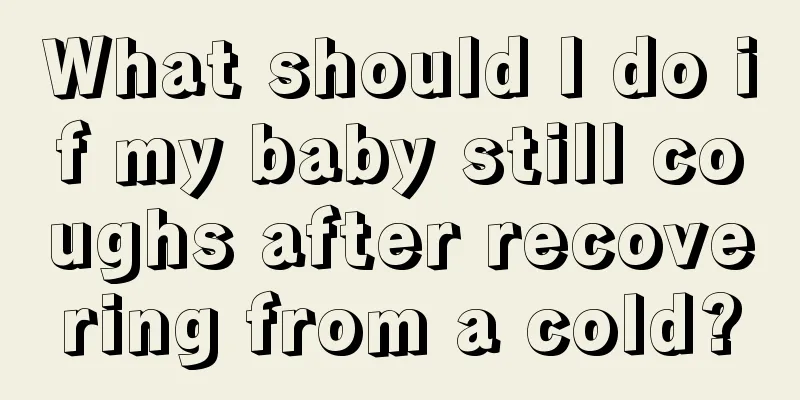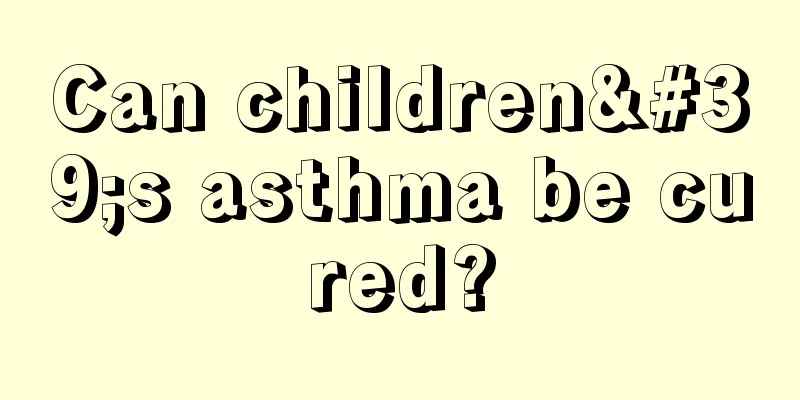Waking up with the urge to defecate

|
Why do you want to defecate as soon as you wake up? If you want to defecate as soon as you wake up, this may be a habit. It may also be caused by cold or enteritis. However, the specific situation needs to be judged based on your own physical condition. You can first observe the number of bowel movements to see if there is abdominal pain. Try not to eat spicy and irritating foods, eat more fresh vegetables and fruits, develop good work and rest habits, avoid overwork, and pay more attention to rest. Symptoms of gastroenteritis 1. Systemic symptoms: Chronic wasting symptoms, sallow complexion, lack of energy, laziness, weakness in the limbs, preference for warmth and fear of cold. For example, during the acute inflammatory phase, in addition to fever, symptoms of dehydration, acidosis, or shock and bleeding may be seen. 2. Gastrointestinal symptoms: intermittent abdominal pain, abdominal distension, abdominal pain and diarrhea are the main manifestations of this disease. It is especially prevalent when exposed to cold, eating greasy food, experiencing emotional fluctuations, or after being tired. The frequency of bowel movements increases, with several times or dozens of times a day, anal prolapse, and uncomfortable bowel movements. 3. Physical signs: long-term abdominal discomfort or dull pain in the lower abdomen. Physical examination may show mild tenderness, hyperactive bowel sounds, and rectal prolapse, mainly in the abdomen, around the umbilicus, or in the lower abdomen. 4. Occasionally there is a feeling of obstruction, pause, and pain behind the sternum, sometimes light and sometimes severe. This often indicates possible esophagitis, esophageal diverticulum or early esophageal cancer. 5. Poor appetite: feeling bloated after meals or all day, belching but no acid reflux, poor appetite, gradual weight loss, and slightly pale or gray complexion. In this case, chronic gastritis should be considered, especially chronic atrophic gastritis and gastroptosis. 6. Pain in the upper and middle abdomen after meals, or nausea, vomiting, or food indigestion: The illness may have lasted for a long time; the pain is regular, such as after catching a cold, getting angry, or eating irritating food. This could be a stomach ulcer. 7. Stomach pain: Stomach pain often occurs about 2 hours after a meal, and may even wake you up in the middle of the night. It can be relieved by eating something, and acid reflux often occurs. It is more likely to occur in autumn and winter, with rhythmic pain in the right upper abdomen. Symptoms and treatment of gastroenteritis. This type of situation may be caused by duodenal ulcer or duodenitis. 8. Anemia, weight loss, and loss of appetite: The stomach problem has not occurred recently, and is accompanied by anemia, weight loss, loss of appetite, and a hard lump can be felt above the navel or heart. This situation should be treated with high vigilance because it may be stomach cancer. 9. Vomiting, chills and fever: Abdominal pain and diarrhea may occur after improper diet or exposure to cold, and may be accompanied by vomiting, chills and fever. This condition may be acute gastroenteritis or acute dysentery. 10. Diarrhea occurs immediately after a meal. Diarrhea occurs after each meal. It occurs if one is slightly cold or has an improper diet. It is also possible to have diarrhea and constipation at times. The diarrhea is watery and the constipation contains more mucus. Sometimes the abdomen is bloated and there is a urge to defecate but no bowel movement occurs when going to the toilet. The patient does not lose weight for several years. This symptom is more likely to be allergic enteritis. Treatment of gastroenteritis 1. Antibiotics If the gastroscopy shows a positive Helicobacter pylori test, antibiotics should be taken. Clarithromycin, amoxicillin, gentamicin, furazolidone, streptomycin, kanamycin, tetracycline, and thiocyanate, etc., all of which have the effect of clearing HP. Generally, two types can be selected, and they are often used in combination with gastric mucosal protectants and antacids. 2. Those with severe upper abdominal pain Atropine, propantheline, belladonna tablets or 654-2 (25-10 mg) can be taken orally to reduce gastric acid secretion and relieve abdominal pain symptoms. Because these drugs have side effects such as dry mouth, palpitations, and difficulty urinating, patients with prostate hypertrophy, glaucoma, cardiovascular disease, etc. should use them with caution or avoid them. 3. Antacids Commonly used drugs include cimetidine, ranitidine, famotidine, sodium bicarbonate (baking soda), magnesium hydroxide, mesothelin, aluminum hydroxide gel, and gaiweiping. 4. Drugs to protect gastric mucosa Commonly used drugs include colloidal bismuth subcitrate (CBS), sucralfate, smectite, mezilin-S, aluminum hydroxide gel, gastrosin and gadolinium, etc. 5. Drugs that regulate gastrointestinal motility For upper abdominal bloating, use metoclopramide or domperidone. For patients who mainly suffer from hiccups, abdominal distension or reflux, gastrokinetic drugs such as metoclopramide, medroxyprogesterone or cisapride (Pribos) can be used. |
<<: One year old baby cries when waking up
>>: Newborn baby crying when waking up
Recommend
Why does my baby have swollen eyes when he wakes up in the morning?
Every baby is the apple of the eye of the whole f...
Babies under one month old sleep less
Generally, newborn babies spend most of their tim...
What to do if your child has kidney stones
In our lives, children with kidney stones should ...
The child's face is full of small pimples
Many parents will find a phenomenon, that is, the...
My baby hasn't had a bowel movement for 8 days and keeps farting
We all know that constipation is very common for ...
What should I do if my child's leg is broken?
In daily life, it is inevitable that there will b...
3-year-old baby loses hair when washing his hair
Hair loss is a very common phenomenon in normal t...
Baby's neck has red spots
As children grow up, they are prone to various ph...
Why do children's teeth turn yellow?
I believe parents will devote all their energy to...
What are the signs of a frightened baby?
What are the symptoms when a baby is frightened? ...
When should babies take vitamin D?
In fact, many trace elements in the human body ar...
Can a child take a bath when he coughs?
Compared with adults, children's bodies are i...
56-day-old baby development standard
Generally speaking, babies grow rapidly every day...
Treatment for diarrhea in children
The problem of diarrhea is the problem of constip...
Why is my baby having a runny nose?
Whether the baby is healthy or not is the topic t...









